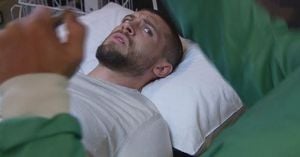Renewed protests have erupted across Italy following the police-related death of Ramy Elgaml, igniting tensions surrounding issues of race, policing, and anti-Semitism. Elgaml, a 19-year-old son of Egyptian immigrants, was killed during a high-speed police chase on November 24, 2024, after failing to stop for officers, sparking significant public outcry.
The tragic events unfolded late at night in Milan’s Crosto neighborhood, where Elgaml and his friend Fares Bouzidi were riding a scooter. During what was initially thought to be routine police procedure, the duo fled — reportedly because Bouzidi did not possess a valid driver’s license, and Elgaml may not have had proper identification. A chase ensued, concluding with the scooter crashing violently against a pole, resulting in Elgaml's death.
Initially treated as a tragic accident, the narrative shifted dramatically with the release of police dashcam footage shortly before recent protests. This footage depicted officers ramming their patrol car against the scooter before the fatal crash. Eyewitness accounts added to the crescendo of anger, with some reporting incidents of police verbally abusing the young men during the chase.
By the weekend of January 12-13, protests erupted anew, particularly centered around major cities such as Rome, Milan, and Bologna. Demonstrators rallied under the banner of anti-racism and justice for Elgaml, reigniting the public's collective anger at perceived police misconduct and systemic racism.
Notably, during these protests, demonstrators clashed violently with police forces. Incidents of vandalism escalated, particularly at the historic synagogue of Bologna. Rioters reportedly breached the synagogue's premises, throwing Molotov cocktails and other explosive devices, all under the banner of justice for Elgaml. Graffiti reading "Justice for Gaza" appeared alongside references to Elgaml, showing the overlap of various political movements converging on the protests.
Bologna’s Mayor Matteo Lepore expressed shock and condemnation, calling the attack "unacceptable" and asserting solidarity with the Jewish community. Slovenia's Jewish community leader, Daniele De Paz, emphatically declared the synagogue assault as deliberate, stating the protesters had aimed to cause damage and instill fear.
Prime Minister Giorgia Meloni also weighed in, expressing "deep concern" over the violent escalations. With increasing public scrutiny, her remarks reflected the mixed political climate, as leaders on both sides of the divide expressed opinions on the unrest. While some criticized the demonstrations, likening them to anti-Semitic acts, others punctuated the protests as legitimate expressions of grievance against police brutality.
This incident raises innumerable questions about the fabric of Italian society. The recent displays of pro-Palestinian support, including Bologna’s decision to display Palestinian flags at city hall, have ignited debates around freedom of speech and public political expression.
After the synagogue attack, prominent voice Gad Lerner articulated the horror of the attack, stating on social media, "It’s simply horrific, terrifying, to see a demonstration of solidarity for young Ramy being used as pretext to assault the Bologna synagogue." His comments underscored the heartbreak many felt witnessing political movements embroiled with conflict turn against places of worship.
Elgaml's family, meanwhile, has pleaded for peace and reconciling ideologies, condemning the violence linked to their son’s name. They issued statements reiteratively stressing, "We believe Ramy’s memory should be a symbol of unity, not division or destruction. We dissociate ourselves from any political use of our son's name.”
These comments reflect the fragile balance between demanding justice for Elgaml and recognizing the narrative risks of allowing such tragedies to engender division. The violent protests, coupled with attacks on religious establishments, point toward deep societal rifts exacerbated by political turmoil.
The aftermath of this incident leaves many wondering about the future of civic dialogue and police relations within Italy. With national sentiments running high and communities divided, the events following Ramy Elgaml’s tragic death serve as both stark warnings of tensions to come and reminders of Italy's complex social-political fabric.
“We take both the calls for justice and the calls for peace seriously,” commented Bologna’s Mayor Lepore, seeking to navigate the challenging waters between differing community sentiments. The road to healing amid violent protests seems increasingly complex, raising questions of how to effectively honor the legacy of those who have fallen, without descending back to cycles of violence.



